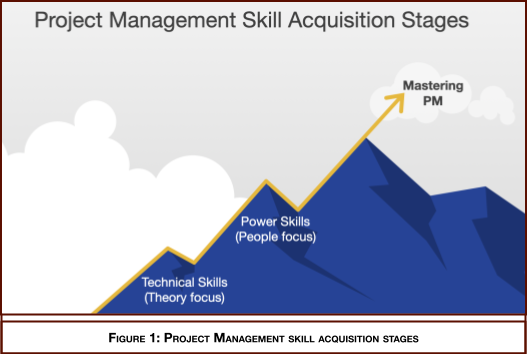Top 3 power skills of project success and how to master them
Power skills enable project management professionals to align their projects to the organization's strategy and inspire their teams to collaborate, solve problems and deliver value. But what exactly are power skills and why are they important in a project context?
What we once used to call ‘soft’ or ‘interpersonal’ or ’people’ skills today are more oftenly named ‘power’ and ‘real’ skills. Empathy, communication, working in teams, decision-making, inspiring others, doing more than we’re asked, for-purpose orientation, being willing to change things, are just some of the ‘power’ skills many consider as important as technical knowledge and skills.
Some would argue that power skills are more significant when it comes to the better performance on individual projects and project portfolios, since projects are people focused more than ever. Consequently, organizations that put emphasis on power skills could anticipate higher agility and project management maturity to help them face complex project challenges, market trends, technological changes, and socioeconomic influence.
Power skills are built on top of solid technical capacities. Simply put, when a certain level of technical maturity is achieved, power skills are emulated and pursued. Project Managers (PMs) usually focus on technical knowledge at the early stage of the career. Which is understandable, since in that way, they learn fundamental practices and acquire theoretical knowledge about processes. But once PMs gain more experience, it becomes clear that project success does not depend only on their technical skills and how well they plan and estimate, but also how they lead, collaborate, and support the team through the process of delivering results.

So what are the top 3 power skills PMs should look into and how to master them?
Power Skill 1: Communication
Even the most basic project management training will teach you how communication is the most important skill that a PM needs. It is true, communication is imperative to the success of any project. But just like every other aspect of project management, the ability to communicate effectively is constantly evolving, and PMs need to keep up.
There is much more to solid communication than just how you talk to people, simply distributing and receiving information. Project management today requires a broader range of communication competences to reflect increasing accountabilities and expectations as PMs take on more complex and more important projects.
To improve your ability to communicate: Harness the power of active listening
In this environment, it is crucial for PMs not only to communicate effectively but to listen actively. This means to understand the ‘why’ behind the project - why it is being undertaken, why now, why in this way, and why this solution - how it contributes to the overall goals of the business. By knowing better the rationale behind the project, PMs can not only perform better, but they are able to contribute in areas outside of their role and can greatly contribute to the overall value of the project work.
Active listening can be reinforced through practical steps such as: (1) taking notes and using body language, e.i. fully engaging with the team members to reduce misunderstanding and project missteps; (2) gathering more data and information on the project, e.i. learning about it to be more competent and confident in leading projects and teams; (3) enhancing rapport among team members and other stakeholders, e.i. forging a bond with stakeholders to strengthen trust.
Power Skill 2: Problem-solving
Problem-solving plays a leading role in project success together with communication. Uncertainty and constraints are part of every project and the PMs role is to manage them by successfully identifying, analyzing, and addressing problems and risks. However, this doesn’t imply that for every project and problem that arises, a perfect solution needs to be found.
Big strategic projects may face minor issues that can be allowed to exist once they are understood. Other projects can experience inconveniences and impose challenges that can spark creative thinking and help the team focus on finding workable solutions and allow the effort to move forward.
To improve your ability to solve problems: Unleash creative thinking
Better problem-solving comes by having freedom to be flexible in thoughts. When the team finds themselves in a situation of constraints and no flexibility in resources, it fosters creative thoughts and new ways of solving problems. Given less, people are forced to step back from traditional methods and do more with what they have. In that way, teams tend to be more creative, more innovative, and achieve better results.
By being focused on overcoming the problem, teams might craft workable solutions, but not the perfect ones. Embracing ‘better done than perfect’ mindset in some situations is needed. This doesn’t mean limiting oneself in achieving excellence as such, but creating something that isn’t perfect, but works, when the situation requires it. Removing imperfections comes gradually. In the end, PMs need to take a unique and customized approach to every project and problem, since one size doesn’t fit all, but seeking perfectionism in every step we take may cost a project success.
Power Skill 3: Collaboration
Since projects are a collaborative environment, it has always been fundamental for the PMs to foster collaboration across teams and encourage decision-making processes with the stakeholders. However, that’s being taken to a new level.
Nowadays, project managers are more often being asked for their opinions and recommendations than to provide and distribute information. They are expected to be strategic thinkers, to contribute and work together with the project team and stakeholders on development of business-related solutions and decisions impacting their initiatives. They are also being exposed to portfolios and business leaders much more frequently, and they’re viewed as more of an equal to those roles. Consequently, PMs have become a core part of the collaborative leadership rather than solely enablers of collaboration.
To improve your ability to collaborate: Advance collaborative leadership success
To enhance collaborative leadership, PMs need to exercise confidence in feeling equal to other leaders involved in the process. Fruitful collaboration demands acknowledgement that everyone involved needs to be able to contribute to achieving outcomes without giving up control based merely on job titles or seniority level. The focus should be on collaboration, working together and having shared accountability for project outcomes.
Wrapping It Up
Project’s don’t succeed because of a formal structure or because of the way work tasks are handled. They succeed when a group of people - teams and stakeholders - commit to one another and when they agree to do what’s for the team and the project. But in order for teams and stakeholders to commit and agree, PMs must be effective in twigging people-focused skills, e.i. power skills. PMs with the right combo of both technical and power skills will deliver project outcomes. Thus, devoting time and effort to master them is needed more than ever.
And which power skills do you invest the most in?
References and further reading
PMI Pulse of the Profession 2023, 14th Edition, Project Management Institute
Let’s stop calling them "soft skills" - and call them "real skills" instead, TED
The Future of Jobs Report 2023, World Economic Forum



